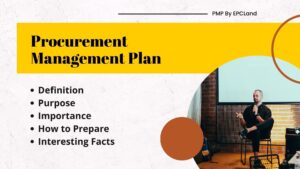As a project manager, intelligent planning can mean the difference between meeting project goals and missing deadlines or doing poorly. Improved schedule management plans help forecast time-related costs, budget and resource allocations, and staff availability.
Creating a realistic schedule management plan for your project will help you create clear schedules, procedures, and documentation. These plans help you achieve expected results at the right time, ensure successful project outcomes, resolve project variances, and improve resource utilization.
But even after careful planning and scheduling, projects can still deviate from plan. As a hands-on project manager, you need to take immediate corrective action to close the gap and get your project back on track. Your schedule management plan should include guidelines on how you and your team will handle such situations.
Don’t Miss the 1000+ MCQ questions & hundreds of quizzes on PMP Knowledge Areas and Various important sections.
Table of Contents
ToggleWhat is Schedule Management Plan
A schedule management plan is a key component of the overall project management plan for a project. It provides project managers and project teams with guidance on how to create, maintain, and manage project plans. A schedule control plan allows project managers to use predefined mitigation steps to address deviations from the plan and keep the project on track.
The “Schedule Management Plan” and associated with the Project Management Institute (PMI) Project Management Professional (PMP)® certification, this document plays a key role in the overall management of your project. Every project has a timeline and every project involves some degree of change. For the changes that impact the project schedule specifically, the Schedule Management Plan (or Schedule Management Plan PMP) provides the project manager with the needed information to take corrective steps to get the project back on schedule.
A Schedule Management Plan describes how the schedule will be managed throughout the project lifecycle. The plan will address issues such as:
- Who is responsible for maintaining the schedule
- How often the schedule will be updated
- What methods will be used to track progress
- How changes to the schedule will be controlled
With an approved Schedule Management Plan, the project management team can make informed choices and guide the project to a positive result.
It also has a timeline for the project including the duration of the individual tasks and critical milestones. Project Managers use schedule management to monitor progress against the baseline schedule, determine how schedule changes are controlled, and report on progress against planned milestones. A schedule management plan provides all schedule-related guidelines.
What are the Components of a Schedule Management Plan?
Project managers want to deliver quality deliverables within budget and on time. So, completing deliverables days, months, or years after the planned deadline is not a successful result. With a strong Schedule Management Plan created to meet the needs of a specific project, Project Managers are better positioned to address threats to the schedule to ensure desired outcomes, including when the project will be completed.
PMI does not provide a universal Schedule Management Plan template, but for example, most will address:
- Who is responsible for maintaining the schedule
- How often will the schedule be updated
- What methods will be used to track progress
- How will changes to the schedule be controlled
- What is the process for approving schedule changes
- How will schedule risks be managed
- What are the project’s milestones and deadlines
Schedule Management Plan components vary depending on the project’s specific needs. Many companies have schedule management plan templates that align with industry and internal project management standards. Used by project managers to involve project team members, stakeholders, and subject matter experts in developing a schedule management plan to develop task duration estimates and ensure accountability for the schedule itself The accuracy of the method should be improved.
How to Create a Schedule Management Plan
Creating a schedule management plan goes beyond planning for how to sequence activities and associated milestones into a schedule. The schedule management plan establishes the management of the schedule throughout the life of the project. The plan should incorporate stakeholder and project team member input to ensure that reporting, monitoring, and controlling processes are established and approved before the project work begins.
To create a Schedule Management Plan, Project Managers should leverage PMI’s A Guide to the Project Management Body of Knowledge (PMBOK® Guide) – Sixth Edition for information, in combination with standards in place at their company. An example schedule management plan creation process would include:
- Determine a scheduling methodology (driven by the project methodology in use)
- Select a scheduling software (in coordination with the IT department and/or Project Management Office)
- Identify who is part of the scheduling management and scheduling process
- Determine performance monitoring processes
- Develop mitigation plans to address schedule variances
- Confirm schedule change control procedures
- Define the schedule report frequency, format, and recipients
The Schedule Management Plan should be reviewed and updated as needed throughout the project lifecycle. As part of the overall project management planning process, the project must be formally approved by the project sponsor or other relevant decision makers before work can begin.
Detailed steps to Prepare Project Schedule Management plan
In the early stages of developing a project schedule management plan, it is recommended to involve team members and subject matter experts to define activities and ensure that the project schedule management plan is as accurate as possible.
Don’t Miss the 1000+ MCQ questions & hundreds of quizzes on PMP Knowledge Areas and Various important sections.
Finalization of a scheduling methodology
The schedule control plan should indicate the project method you plan to use. Certain project methods are best suited for certain projects. Some examples are Sequential Critical Path Methodology (CPM), which is based on the concept that some tasks cannot start until the previous task is completed, and Agile Project Management (APM), which prioritizes shorter iteration cycles and flexibility. .
Choose the best project scheduling software
The plan should also clearly state the project planning software you plan to use. The software helps you manage your projects expertly, including all team members involved. Give everyone access to a software consulting engagement that includes everyone in choosing the best option.
Create a schedule base
A schedule management plan should establish a solid project baseline so that all workgroups have a clear understanding of the project, its goals, and whether it is on track. Baselines allow you to evaluate project performance over time.
Identify key performance indicators
Your schedule management plan should include a process for sending feedback, reviewing, and implementing tasks. This allows team members and stakeholders to work and hold themselves accountable to established standards.
Create a contingency plan for deviations from the plan
A contingency plan for potential risks and deviations should be documented and communicated to eliminate project bottlenecks, dependencies and delays.
Identify procedures for managing schedule changes
Add instructions about when elements of the schedule can be changed, who has the authority to make changes, how quickly and which teams and his members should be notified or given permission.
Measure project performance
A schedule management plan should indicate how often project performance should be measured to achieve the best project outcomes. Do you measure project performance weekly or monthly? How do you measure and how do you provide reporting? What project planning software, tools and metrics do you use?
Identify project deviation thresholds
Project schedules should include variance thresholds to guide teams and stay within standards, budgets, and set timelines. A schedule performance index indicates whether a project is behind or ahead of schedule, and a deviation threshold defines when corrective action should be taken.
Plan the format and frequency of reporting
Your project schedule should describe how you and your team members will submit updates within the project. Questions such as “Who will send progress reports?” who receive them? Are you using bar charts, simple lists, or network charts? Reporting methods and procedures should be followed to ensure quality assurance and completion of tasks within a project.
Benefits of schedule management plans
When your schedule control plan is customized to your project requirements and aligned with your project management methodology, you are more likely to meet your project goals on time and on budget. A well-designed schedule management plan has the following benefits:
- Effective management of time-related costs
- Accurate schedule forecasts and estimates
- Effective management of time-related resources
To achieve maximum benefit, schedule control plans should be created within the project planning process and coordinated with other plans within the overall project management plan.
What is the difference between project planning and scheduling?
A project plan is a comprehensive document that contains various components such as project requirements, goals, scope, risks, budget and schedule. A project schedule, on the other hand, is a document containing start and finish dates and a set of tasks and activities within a project. A project plan shows what needs to be done, allocating resources and staff, and due dates for tasks and projects.
A project plan focuses on all the deliverables and processes of a project, whereas a project plan focuses on timing.
Order and dependencies, from start to finish. Remember that project planning and scheduling is not a one-time activity. Experienced project managers continually update these documents to learn from their real-world impact on project plans.
Final Take Away from Project Scope Management Plan
Project managers use schedule management to set administrative guidelines for scheduling responsibilities, resources, and accountabilities. The schedule control plan is incorporated into the project control plan. The PMBOK® Guide indicates that the planning process should include the following elements: The overall project management plan, schedule management plan is tailored to the specific needs of the project. This is a document that guides you on how to manage your planning processes and procedures to ensure better results.
FAQs: on Project Scope Management Plan
How do I create a schedule?
Contains the steps required to create a project schedule. For example, how to determine project activities, how to allocate resources to activities, how to estimate effort, what scheduling methods should be used, etc., are all part of the schedule management plan.
What tools do you use for planning?
For example, if your company has a predefined cost estimation model, this should be included. Planning tool to use. B. Microsoft Project should also be included in the schedule management plan.
How do I schedule a project?
To schedule a project, you also need a plan. Defining project activities, allocating resources to activities, estimating effort, sequencing activities, and completing the project plan should be well planned. And it is included in the timetable management plan.
How do you effectively manage and control projects against baselines and how do you manage variances?
When a project schedule is created, a baseline of the schedule is created. However, changes and deviations are inevitable in projects. Additionally, project plans must be readjusted based on approved change requests and plan variances. How to do this is described in the timetable








































